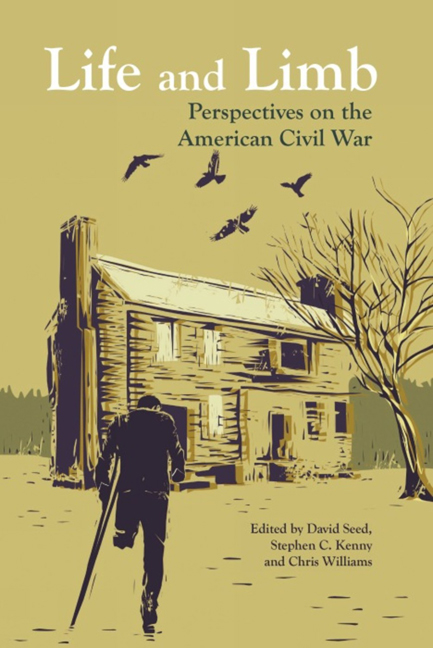Book contents
- Frontmatter
- Contents
- List of Illustrations
- Acknowledgements
- Introduction: Civil War Voices and Views
- MEDICAL AND SURGICAL MEMOIRS
- ACCOUNTS OF NURSING
- MEDICAL FACILITIES AND PATHOLOGY
- Jonathan Letterman on the Medical Corps: Medical Recollections of the Army of the Potomac
- The Confederate Military Prison Hospital at Andersonville, Georgia: Contributions Relating to the Causes and Prevention of Disease
- Field Hospitals: A Glimpse: Hardtack and Coffee
- Field Hospitals: The Need: A Manual of Military Surgery
- Plea for an Ambulance Service: A Brief Plea for an Ambulance System
- Hospital Broadside: North Carolina Hospital Broadside, 1863
- Hospitals in Richmond, Virginia: A Diary from Dixie
- Malingering: ‘Surgical Reminiscences of the Civil War’ and A Rebel's Recollections
- Roberts Bartholomew on Nostalgia: Contributions Relating to the Causes and Prevention of Disease
- Medical Welfare Begins: ‘Debut and Prospectus (The Crutch) and ‘Wounded’ (poem by ‘Sanatosia’)
- (Dis)embodied Identities: Civil War Soldiers, Surgeons, and the Medical Memories of Combat
- PHOTOGRAPHY
- AMPUTATIONS AND PROSTHETIC LIMBS
- IN THE FIELD OF BATTLE
- POST-WAR NARRATIVES
- Contributors
- Select Bibliography
- Index
- Plates
Roberts Bartholomew on Nostalgia: Contributions Relating to the Causes and Prevention of Disease
from MEDICAL FACILITIES AND PATHOLOGY
- Frontmatter
- Contents
- List of Illustrations
- Acknowledgements
- Introduction: Civil War Voices and Views
- MEDICAL AND SURGICAL MEMOIRS
- ACCOUNTS OF NURSING
- MEDICAL FACILITIES AND PATHOLOGY
- Jonathan Letterman on the Medical Corps: Medical Recollections of the Army of the Potomac
- The Confederate Military Prison Hospital at Andersonville, Georgia: Contributions Relating to the Causes and Prevention of Disease
- Field Hospitals: A Glimpse: Hardtack and Coffee
- Field Hospitals: The Need: A Manual of Military Surgery
- Plea for an Ambulance Service: A Brief Plea for an Ambulance System
- Hospital Broadside: North Carolina Hospital Broadside, 1863
- Hospitals in Richmond, Virginia: A Diary from Dixie
- Malingering: ‘Surgical Reminiscences of the Civil War’ and A Rebel's Recollections
- Roberts Bartholomew on Nostalgia: Contributions Relating to the Causes and Prevention of Disease
- Medical Welfare Begins: ‘Debut and Prospectus (The Crutch) and ‘Wounded’ (poem by ‘Sanatosia’)
- (Dis)embodied Identities: Civil War Soldiers, Surgeons, and the Medical Memories of Combat
- PHOTOGRAPHY
- AMPUTATIONS AND PROSTHETIC LIMBS
- IN THE FIELD OF BATTLE
- POST-WAR NARRATIVES
- Contributors
- Select Bibliography
- Index
- Plates
Summary
Roberts Bartholomew was a professor at the Medical College of Ohio and served as Assistant Surgeon in the army. The following extract is taken from Bartholomew's ‘The Various Influences Affecting the Physical Endurance, the Power of Resisting Disease, etc., of the Men Composing the Volunteer Armies of the United States,’ published as Chapter 1 of Austin Flint, ed., Contributions Relating to the Causes and Prevention of Disease (1867).
See also: J. Theodore Calhoun, ‘Nostalgia as a Disease of Field Service’, Medical and Surgical Reporter 11 (1864), pp. 130–32; and D.L. and G.T. Anderson, ‘Nostalgia and Malingering in the Military during the Civil War’, Perspectives in Biology and Medicine 28.i (Autumn 1984), pp. 156–66. The term ‘nostalgia’ was a seventeenth-century coinage applied to soldiers serving in action away from home.
The term nostalgia is derived from two Greek words, signifying, in our vernacular, home-sickness. The derivation of the word indicates the pathology. It is a mental disorder, and belongs to the class melancholia. Certain physical symptoms precede, accompany, or follow the development of the mental aberration: heat of head; increased rapidity of the circulation; constipation; gastro-intestinal disorders of various kinds; a low febrile state simulating typhoid. The mental despondency and the exaltation of the imaginative faculty increase with the decline in the physical strength. Weeping, sighing, groaning, and a constant yearning for home; hallucinations and sometimes maniacal delirium, are the particular forms in which the disorder of the brain expresses itself.
Does the mental state precede the development of the physical symptoms? Is this sufficient of itself to produce that train of gastro-intestinal disorders and febrile phenomena which characterize the progress of the case? My own experience leads me to the conclusion that derangement of the health, particularly of the primary assimilation, leads to the disorders of intellect, and that in those cases in which the affection of the mind precedes the physical disorders, there is much reason to suspect a predisposition to mental derangement to have existed. These questions are not without interest in view of the causes and degree of prevalence of nostalgia during the war.
- Type
- Chapter
- Information
- Life and LimbPerspectives on the American Civil War, pp. 74 - 75Publisher: Liverpool University PressPrint publication year: 2015



